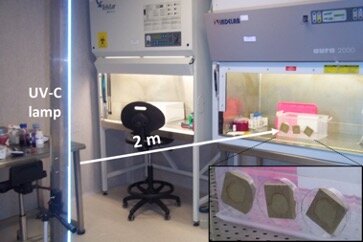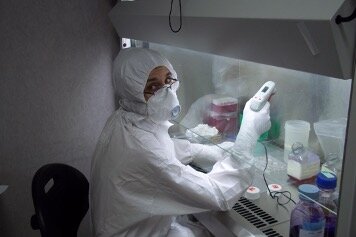By Cristian Smerdou and Ines M. Anton | Apadrina la Ciencia board members
Dear supporters,
First of all, we really hope that now that the COVID pandemic is pretty much under control, and has become almost a thing of the past, you continue to be safe and can enjoy life as it was before COVID!
In this report, we would like to express again our most sincere gratitude for your generous contributions.
We also take this opportunity to give you a brief update of how your donations have contributing to the fight against COVID-19 during the last year.
Thanks to your help we have been able to complete some studies aimed at both controlling the COVID-19 disease as well as to inactivate the SARS-CoV-2 virus in the environment to prevent infections. These studies have been performed at the Center for Applied Medicine (CIMA) of the University of Navarra (Spain) in collaboration with groups from the CEIT Basque Research and Technology Center (San Sebastian, Spain) and the Center of Molecular Biology (CBM, Madrid, Spain).
In these studies we were able to evaluate the anti-COVID capacity of compounds able to kill “old cells” in the body. These old cells, also called senescent cells, seem to be involved in the progression of the COVID-19 disease and are more abundant in older people, making them more susceptible to have the severe symptoms of Covid-19. We found that using a mix of two of those compounds, also called “senolytic drugs” we reduced mortality, delayed the onset of disease, and reduced the number of clinical symptoms in old mice infected with SARS-CoV-2. This study, which was led by our collaborator Cayetano von Kobbe (CBM) in collaboration with the group of Cristian Smerdou at CIMA offers some hope for the treatment of severe COVID, especially in elderly patients. In order to make these results available for the scientific community we recently published this study in the prestigious journal “Ageing Cell” (2023 Mar;22(3):e13771). In this article we readily acknowledged your contribution to Apadrina la Ciencia.
In addition, we also developed a method to inactivate the SARS-CoV-2 virus using an autonomous moving robot that emits ultraviolet light. We showed that an exposition of less than one minute was enough to completely inactivate the virus present on a surface at a distance of two meters! See the photo of how we tested the inactivation of the virus with ultraviolet light in our biosafety level 3 laboratory at CIMA. The virus had been deposited on the surface of different materials, in this case wood blocks. This system could be very useful to decontaminate hospital rooms and public spaces. These studies, which were recently published in the Journal of Photochemistry and Photobiology (2022 Sep;11:100138) were performed by Cristina Olagüe in the group of Cristian Smerdou and Gloria Gonzalez Aseguinolaza at CIMA in collaboration with groups at CEIT Basque Research and Technology Center.
Being aware that communicating our research to the general public is very important we have also participated in some outreach activities. As an example, in March 2023, one of our collaborators, Cristian Smerdou, gave several talks to elderly people about the origin of COVID-19 and the research performed at CIMA. This was part of a teaching program for senior citizens organized by the University of Navarra.
A great part of this work has been possible thanks to your help. In particular we employed your money to buy reagents used in these studies. For example, with every 10 € donation, the researchers were able to analyze one laboratory sample to determine whether a certain compound, like the senolytic drugs previously mentioned, could have some effect on the infection by SARS-CoV-2. In this picture you can see how one of our technicians at CIMA manipulates SARS-CoV-2 samples in a safety hood inside our biosafety level 3 laboratory. But each compound had to be tested at many different concentrations in different cells, as well as in animals, making the number of samples for these studies very high.
As Dr. Smerdou explains “Our group at CIMA Universidad de Navarra in collaboration with other groups have found some promising compounds that could mitigate the severe symptoms of Covid-19 and prevent infections”. These results are important and if translated to the clinic they could hopefully contribute to save lives in the future.
We will let you know soon where your generosity is headed next time!
In the meantime, please help us spread the word further, among family, friends, colleagues…
By donating your money to Apadrina la Ciencia, you are contributing to projects that help handle the COVID-19 pandemic in Spain and to understand the Science behind the SARS-CoV-2 and the pandemic.
Thank you all again for your support!
See you soon!
Project reports on GlobalGiving are posted directly to globalgiving.org by Project Leaders as they are completed, generally every 3-4 months. To protect the integrity of these documents, GlobalGiving does not alter them; therefore you may find some language or formatting issues.
If you donate to this project or have donated to this project, you can receive an email when this project posts a report. You can also subscribe for reports without donating.
Support this important cause by creating a personalized fundraising page.
Start a Fundraiser
